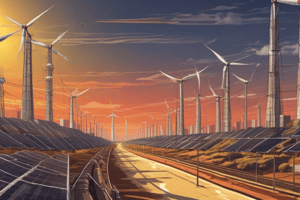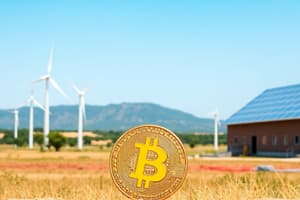Podcast
Questions and Answers
What is a carbon footprint?
What is a carbon footprint?
- The total number of trees planted in a forest
- The total weight of soil in an ecosystem
- The total amount of greenhouse gas emissions associated with an individual, organization, or product (correct)
- The total amount of water used in agriculture
Which renewable energy sources can help reduce carbon footprint?
Which renewable energy sources can help reduce carbon footprint?
- Nuclear power only
- Solar, wind, and hydroelectric power (correct)
- Coal and natural gas
- Diesel and gasoline
How does sustainable agriculture contribute to environmental preservation?
How does sustainable agriculture contribute to environmental preservation?
- By reducing soil erosion and conserving water (correct)
- By encouraging deforestation
- By increasing greenhouse gas emissions
- By depleting natural resources
What are technologies that aid in reducing greenhouse gas emissions to combat global warming?
What are technologies that aid in reducing greenhouse gas emissions to combat global warming?
What is the main focus of sustainable agriculture?
What is the main focus of sustainable agriculture?
Which energy source saw the largest growth in new power generation according to the text?
Which energy source saw the largest growth in new power generation according to the text?
What do mitigation strategies aim to achieve in the context of global warming solutions?
What do mitigation strategies aim to achieve in the context of global warming solutions?
How can individuals contribute to reducing their carbon footprint?
How can individuals contribute to reducing their carbon footprint?
What is one key component of adapting to climate change according to the text?
What is one key component of adapting to climate change according to the text?
Which renewable energy source experienced the highest capacity growth in 2022?
Which renewable energy source experienced the highest capacity growth in 2022?
Flashcards are hidden until you start studying
Study Notes
Reducing Carbon Footprint and Sustainable Solutions
From the hustle of classroom exams to the complexities of climate change, the search results provided leave us straying from the topic of carbon footprint reduction and sustainable solutions. However, I'll paint a picture using the broader context of sustainable practices that contribute to a healthier planet.
Carbon Footprint and Renewable Energy Sources
A carbon footprint is the total amount of greenhouse gas emissions associated with an individual, organization, or product. Reducing our carbon footprint requires a shift to renewable energy sources like solar, wind, and hydroelectric power, as these emit fewer greenhouse gases than fossil fuels.
Sustainable Agriculture
Sustainable agriculture aims to optimize crop yields while preserving the environment and protecting natural resources. Practices such as crop rotation, cover cropping, and precision farming reduce soil erosion, conserve water, and improve soil health.
Climate Change Impacts
Climate change affects weather patterns, sea levels, and ecosystems, leading to increased natural disasters and extinction of species. Adaptation and mitigation strategies are crucial to minimizing the impacts of climate change.
Global Warming Solutions
Reducing greenhouse gas emissions is a foundational strategy to combat global warming. Technologies like carbon capture, energy storage, and electric vehicles contribute to this effort.
The Role of Renewable Energy
Renewable energy has rapidly grown in the last decade, with solar and wind power accounting for an ever-increasing portion of global electricity production. The International Renewable Energy Agency (IRENA) reports that renewable energy capacity grew by 9% in 2022, with solar energy being the largest source of new power generation.
The Importance of Sustainable Agriculture
Sustainable agriculture focuses on long-term environmental and economic health. It addresses issues such as soil degradation, water scarcity, and food security. Organic farming and regenerative practices promote agroecology, which emphasizes the interconnectedness of plants, animals, and the environment.
Climate Change Impacts and Adaptation
Climate change affects temperatures, precipitation, sea levels, and extreme weather events. Communities and governments must adapt to these changes by preparing infrastructure, creating disaster response plans, and implementing resilient design strategies.
Global Warming Solutions and Mitigation Strategies
Mitigation strategies aim to reduce greenhouse gas emissions, promoting a low-carbon economy. Governments, businesses, and individuals can all play a role in reducing their carbon footprint through energy-efficient technology, sustainable food production, and eco-friendly transportation.
In summary, reducing our carbon footprint, transitioning to renewable energy sources, and promoting sustainable agriculture are essential strategies for slowing climate change and mitigating its impacts. By working together, we can create a more sustainable future for our planet. are not directly relevant to the specific topic provided but rather to unrelated searches.
Studying That Suits You
Use AI to generate personalized quizzes and flashcards to suit your learning preferences.




